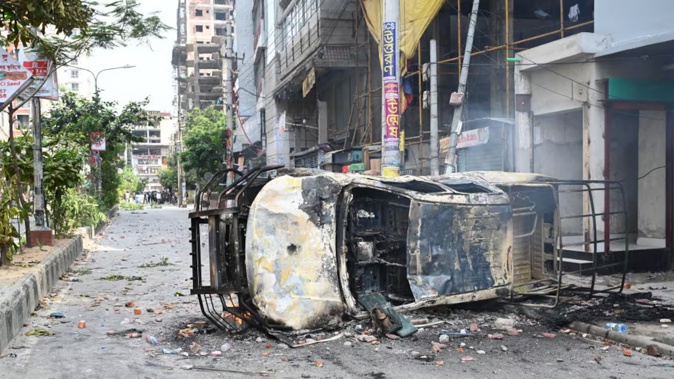
Soldiers have been patrolling the deserted streets of the Bangladesh capital Dhaka and the government ordered all offices and institutions to stay closed for two days after at least 114 people were killed this week during student-led protests against government job quotas.
At least four people died, according to hospital data, during sporadic clashes on Saturday in some areas of Dhaka, which has been the centre of the protests, and where security forces set up road blocks to enforce a curfew.
Prime Minister Sheikh Hasina’s government declared Sunday and Monday as “public holidays” due to the situation in the country, with only emergency services allowed to operate.
Authorities had earlier closed universities and colleges from Wednesday.
Nationwide unrest broke out following student anger against the quotas for government jobs, which included 30% reserved for the families of those who fought for independence from Pakistan.
Hasina’s government had scrapped the quota system in 2018, but a court reinstated it last month.
The Supreme Court suspended the decision after a government appeal and will hear the case on Sunday after agreeing to bring forward a hearing scheduled for August 7.
The demonstrations – the biggest since Hasina was re-elected for a fourth successive term this year – have also been fuelled by high unemployment among young people, who make up nearly a fifth of the population.
Internet and text message services in Bangladesh have been suspended since Thursday, cutting the nation off as police cracked down on protesters who defied a ban on public gatherings.
Overseas telephone calls mostly failed to connect while websites of Bangladesh-based media organisations did not update and their social media accounts remained inactive.
“To take a country of nearly 170 million people off the internet is a drastic step, one we haven’t seen since the likes of the Egyptian revolution of 2011,” said John Heidemann, chief scientist of the networking and cybersecurity division at USC Viterbi’s Information Sciences Institute.
The internet shutdown meant many people could not top up their electricity meters, leaving them without power.
Thousands injured after clashes between students and police
The clashes have injured thousands, according to hospitals across Bangladesh. The Dhaka Medical College Hospital received 27 dead bodies within two hours on Friday.
The curfew was eased for two hours from noon on Saturday to allow people to shop for supplies and complete other chores, television channels reported.
It will last until 10am on Sunday, when the Government will assess the situation and decide the next course of action, the reports added.
Those venturing out on the streets had their identification cards inspected by army personnel at different check points, TV footage showed.
During the week police fired tear gas, rubber bullets and hurled sound grenades to scatter protesters throwing bricks and setting fire to vehicles.
Take your Radio, Podcasts and Music with you









